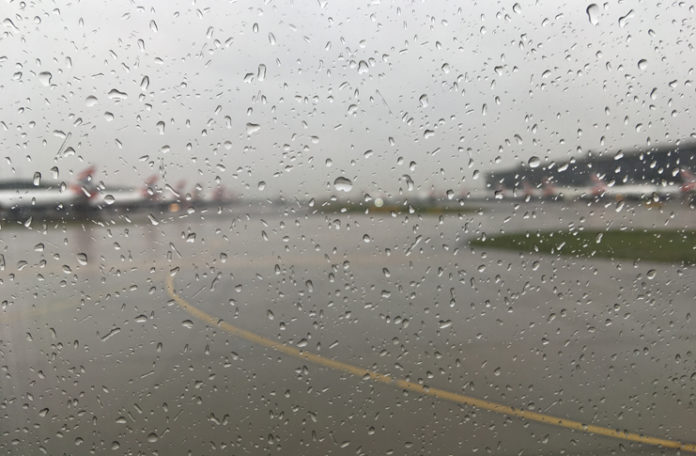
TravelingForMiles.com may receive commission from card issuers. Some or all of the card offers that appear on TravelingForMiles.com are from advertisers and may impact how and where card products appear on the site. TravelingForMiles.com does not include all card companies or all available card offers.
Some links to products and travel providers on this website will earn Traveling For Miles a commission that helps contribute to the running of the site. Traveling For Miles has partnered with CardRatings for our coverage of credit card products. Traveling For Miles and CardRatings may receive a commission from card issuers. Opinions, reviews, analyses & recommendations are the author’s alone and have not been reviewed, endorsed, or approved by any of these entities. For more details please see the disclosures found at the bottom of every page.
So far, I’ve been very fortunate. None of the people that I care about most has contracted COVID-19, no one I know has died, and no one I know has become dangerously ill. Yes, just like for millions of other people, the pandemic has affected my life negatively in numerous other ways (some worse than others), but when it comes down to the ultimate price this pandemic can extract, I’ve been spared.
Yesterday, I was given a stark reminder of not only how fortunate I’ve been so far, but also just how real the current crisis is. It wasn’t a reminder I’d like to receive again.
In the Western hemisphere, we’ve been living with the pandemic for approximately ten months, and after months of lockdowns and months of having numbers and statistics assaulting our eyes and ears on a daily basis, it’s easy to become sanitized to what’s going on in the world.
If the health of you and your loved ones is not being directly affected by the virus or if you’re not working on the front lines, the numbers and stories you see on TV, read online, and in newspapers can become just that – stories and numbers. The higher the numbers get, the harder it can be for the human brain to absorb the horror it’s being fed so, sometimes, it takes a short, sharp shock to put everything back into focus.
I’m not saying that I’ve become numb to other people’s suffering or that I’ve become emotionally detached from the pain that I see being inflicted on the lives of others, but a small but significant incident yesterday afternoon caught me off guard and left me more than a little shaken.
At a little past 2 pm yesterday, I was in the middle of a phone call with a phone agent for a major corporation (the name of the corporation is irrelevant to this story ) and the agent was working from home (let’s call the agent Mary). I had never spoken to Mary before but she was pleasant, friendly, and polite, and in between dealing with the business at hand, we exchanged a few snippets about our daily lives (“how’s lockdown going for you?”, “I wish this rain would stop so we could go outside”, “how are you dealing with the stores being closed?” etc…). It was pretty routine, banal, stuff.
Suddenly (this happened in the space of less than a second), Mary went from being in a cheerful conversation with me to being in floods of tears and mostly unable to speak. She managed to get out the words “sorry, I’ve just had some terrible news, I’ll have to put you on hold” before the phone line went quiet.
A few minutes later, she came back on the line but was still clearly incredibly upset. I asked her to forget the work she had been doing for me (it was more than a little insignificant at this point) and asked her if she wanted to talk.
Our conversation was short but it was long enough for her to tell me this: Her mother had been trying to call her all day but she hadn’t had a chance to talk to her because she was snowed under with work. She had been planning to call her back in the evening. A few moments earlier, a text message popped up on her screen that she couldn’t avoid seeing – it told her that her father had passed away.
In between tears, Mary told me that her father had been taken ill with the virus just a few days before, he had been in hospital for no more than 48 hours and, at least up until the previous evening when she last checked in on him, he was being looked after in a regular hospital ward and not the ICU. Now, he was no longer with us.
That was pretty much the end of our conversation.
Over the years, I’ve lost quite a few members of my own family so I’m probably more insulated than most against the emotions that news of a death brings, but this news really hit me hard. I’ve never met Mary, I don’t know Mary, I’ve never spoken to Mary before and I’ll probably ever speak to her again, and yet the news of her father’s sudden death really hit home.
I don’t know whether it was the experience of being there the very second that Mary found out that someone she loved had passed away that made me feel as I did, or whether listening to Mary’s news was just a catalyst that opened up a whole world of pent-up emotions that have been building up as the pandemic has dragged on. Frankly, it doesn’t really matter which of the two it is.
I’ve never been blasé about the death and destruction that the pandemic has wrought, but as the months have dragged on, I’ve definitely been guilty of starting to let things wash over me and guilty of allowing my mind to normalize the damage and suffering that people in the streets, towns, and cities around me have been facing (and are still facing today).
I think (hope) that my experience on the phone with Mary may have changed that – it’s too early to tell.
The death of Mary’s father wasn’t a number or a statistic on a screen or in a newspaper. For Mary and me, emotionally, it was something that happened right there in the middle of our phone call and it was very, very real. Listening to someone get news of a loved one dying is a horrible experience even if that someone isn’t a person you know at all, and while for Mary the experience was unquestionably infinitely worse than it was for me, it was certainly an experience I’m going to remember for some time.
It’s an experience that comes as a timely reminder to me that what we’re seeing on TV is real. The numbers representing the dead also represent real people. Real mothers, fathers, brothers, and sisters, and just because we’ve been living through this pandemic for a lot longer than most of us expected, it doesn’t mean that we should be taking things any less seriously now than when this was all still very new and scary.
Please wear a mask. Please consider others when you go outside your home. And please don’t take this virus to be anything other than a very real and very deadly enemy – because that’s exactly what it is.

















well written. well messaged. the pandemic does need these sort of reminders that it really isn’t that very far from any of us at any moment. thanks for reminding us.
Thank you so much for the reminder. It is also worth noting that COVID-19 deaths are not always immediate. My mother tested positive on December 10, spend December 20th-27th in the hospital, and then was released back to her assisted living facility. She suffered a side effect, parosmia, where food and drinks all taste horrible…sometimes of kerosene or rotting meat. She could not bring herself to eat or to drink more than a few sips, no matter how many different foods or drinks we tried. She passed away Saturday, January 16th, 4 days short of her 89th birthday.
Very sad story about a personal tragedy, but also the sort of story that leads to biassed risk assessment. Unfortunately, people die everyday (nearly 3,000,000 deaths in the USA every year) and as a matter of probability this was not likely the only time that somebody you spoke to was touched by a personal tragedy that day, but only the first time that the social conditions were such – a national crisis that is simultaneously on the minds of everybody – that somebody would share that fact.
This doesn’t make Covid any less real, but shows how it can seem more prevalent than it actually is when everybody is so focussed on it.
Hi Mak,
Here’s the thing. Yes – people die every day – but this is a communicable disease – so that’s one of the things that make it different. And this death was – at it’s heart – preventable. Every preventable death is tragic and the carnage that is being visited on the United States is appalling to watch – and all the more so for the total mismanagement resulting in the deaths of hundreds of thousands of people.
Imagine if we hadn’t over reacted to a virus and ruined 7Billion for a year 🙁
That’s the real tragedy that occurred.
The wealthy first world hid behind their screens while the poor and rest of the world kept on working and trying to survive.
The greatest tragedy of all this is the selfishness of those who stayed home.
There’s something seriously wrong with you if you don’t think that the “real tragedy” or “the greatest tragedy of all” is the 2m+ deaths.